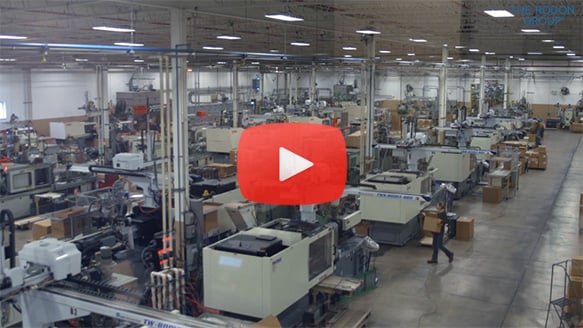Capabilities
Facilities and manufacturers conducting sensitive processes rely on white rooms to prevent subject contamination. White rooms require no certification but still provide a sterile, controlled environment for processes that do not require a clean room. Various applications use white rooms, but it is essential to consider procedures to keep the white room clean.
The Rodon Group has been delivering US-made plastic injection molded products since 1956. We have expanded to offer white room manufacturing, robotic manufacturing, and various advanced capabilities with a fleet of over 125 plastic injection molding presses.
What Is a White Space?
A white space is a controlled area within a manufacturing facility that functions similarly to a clean room. It is considered to be a step down compared to a clean room but still offers a controlled environment where airborne contaminants are removed. White rooms control the number of particles per cubic meter, humidity, and temperature, making them ideal for manufacturing components sensitive to airborne contaminants that do not require a certified clean room.
What Are White Rooms Used For?
Various manufacturers and facilities use white rooms for processes affected by airborne particles and contaminants. Some of the industries that use white rooms include the following:
- Aerospace
- Electronics parts production
- Manufacturing
- Medical facilities
- Military applications
- Pharmaceutical
- Research facilities
How Is a White Room Kept Clean?
While white room air filtration and climate control will reduce contaminants, implementing procedures to prevent contamination will assist in reducing airborne particles. Production activities, substances and personnel entering the white room, and handling of materials can release contaminants into the air of the white room. The following procedures will help keep the white room clean:
- Personal Protective Equipment (PPE): White room personnel must wear PPE before entering a white room to prevent particles from clothing, skin, and hair from being introduced to the air.
- Hair Covering: Covering personnel's hair prevents the introduction of particles and strands of hair to the white room. Personnel should ensure their hair is completely covered and no strands are outside of the covering.
- Gloves: Proper use and removal of gloves prevent the introduction of particles from the hands of personnel to the clean room.
- Gowning area: A designated and clearly defined gowning area offers a space for personnel to equip their PPE, including a mask, goggles, shoes, hair coverings, and white room suit, before entering. The gowning area will prevent personnel from bringing contaminants into the white room.
- Furniture: Conventional furniture can release particles into the white room over time. Invest in white room furniture to prevent contamination.
- Consumable goods: Paper and notepads for white room use should be made with a polyethylene binding and white room-grade paper to prevent contamination. Polypropylene labels also eliminate gas and leachables from being introduced to the white room.
- Cleaning equipment: Vacuums, clean mops, and adhesive rolls are ideal for capturing debris and dirt on white room surfaces.
- Sticky floors: Sticky floors and mats for white rooms offer a durable and contamination-resistant surface compared to conventional flooring.
How Are White Rooms Designed?
White rooms come in various designs depending on the application or industry's requirements. They can have soft foil curtain walls or hard walls made of solid materials. Soft wall designs protect the white room air from contaminants with PVC curtains, exhausting air underneath the curtains. Solid wall constructions offer higher air quality, including pure air classes for the white room.
Contact Rodon Group for Your White Space Room Needs
White room manufacturing is essential for delivering sensitive products. They minimize particulates and control air temperatures and humidity levels to ensure sensitive equipment achieves the highest production standards. The Rodon Group uses white rooms to manufacture sensitive equipment with fewer defects. Request a quote to speak with a specialist about the white room solution for your facility or manufacturing needs.







.jpg?width=300&name=Epoxy%20Floor%20(1).jpg)



